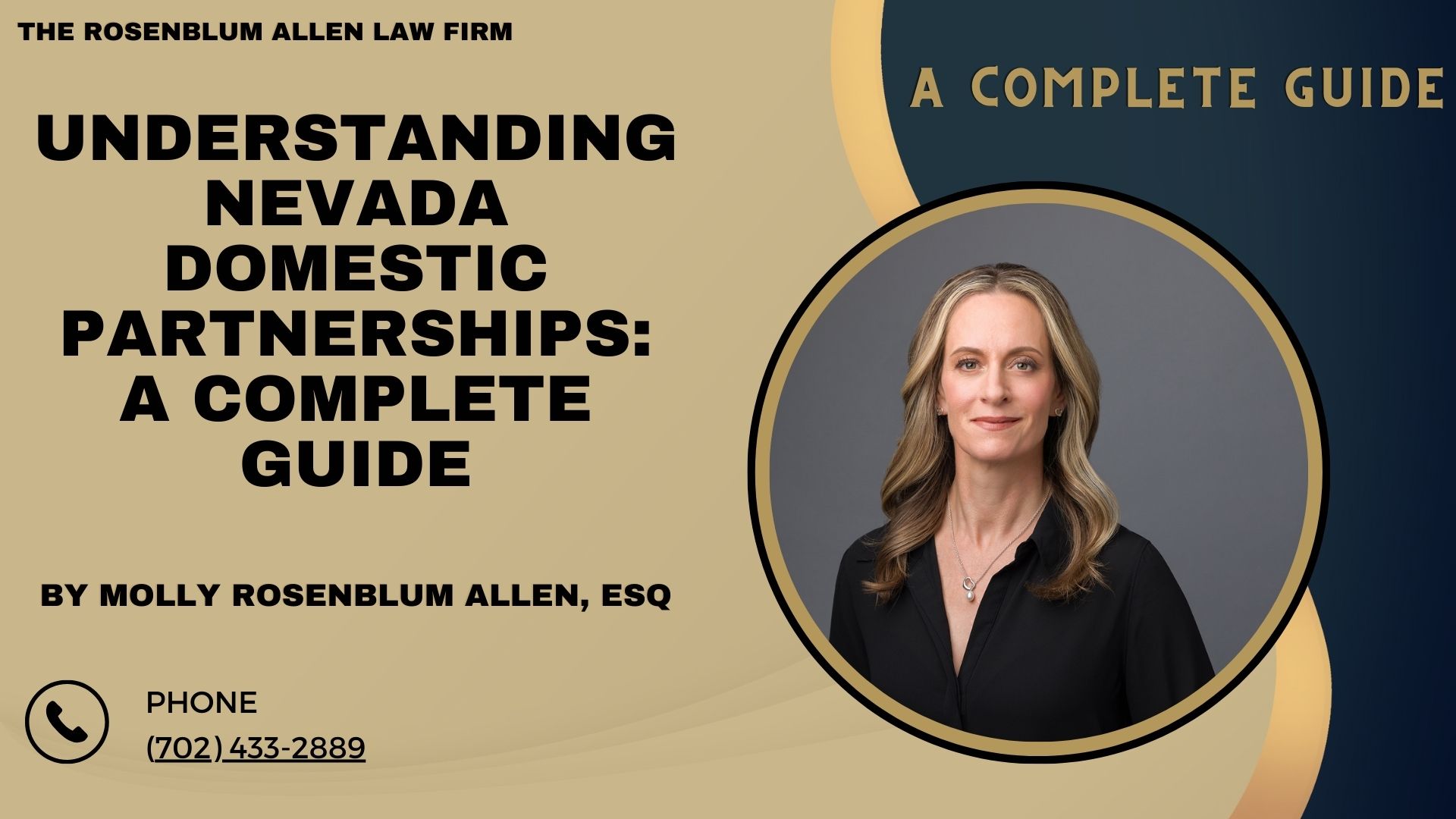Domestic partnerships in Nevada offer an alternative to marriage for couples seeking legal recognition of their relationship. This guide is designed to navigate the intricacies of Nevada domestic partnerships, from eligibility requirements to the rights and responsibilities that come with it. Whether you’re considering entering into a domestic partnership or simply wish to learn more about the options available in Nevada, this comprehensive guide is here to provide you with all the necessary information.

What is a Domestic Partnership in Nevada?
A domestic partnership in Nevada is a legal relationship between two individuals who live together and share a domestic life but are not married. It grants couples many of the same rights, protections, and benefits as marriage. This section will explain the concept of a domestic partnership, how it differs from marriage, and why it might be a preferred option for some couples.
Eligibility Requirements
To enter into a domestic partnership in Nevada, couples must meet certain criteria. This includes being at least 18 years old, not being married or in another domestic partnership, and sharing a common residence. This subsection will detail all the requirements and how to prove eligibility.
The Process of Registering a Domestic Partnership
Registering a domestic partnership in Nevada involves filling out an application, paying a fee, and submitting the necessary documentation to the Secretary of State’s office. This subsection will guide you through each step of the process, including where to find the application and what documents you will need.
Required Documents and Fees
A list of documents required for registering a domestic partnership, such as proof of identity and residence, and the current registration fee will be outlined here.
Where and How to Apply
This will provide information on where to submit your application (online, mail, in person) and tips for a smooth application process.
Rights and Responsibilities
Understanding the legal implications of entering into a domestic partnership is crucial. This section will cover the rights and responsibilities of domestic partners in Nevada, including property rights, healthcare decisions, and obligations to each other.
Property Rights and Responsibilities
Here, we’ll discuss how property is owned and divided in a domestic partnership, including what happens if the partnership ends.
Healthcare Decisions and Hospital Visitation Rights
This subsection will explain the rights domestic partners have to make healthcare decisions for each other and the hospital visitation rights.
Financial Responsibilities
An overview of the financial obligations domestic partners have towards each other, such as support obligations and responsibility for debts incurred during the partnership.

Ending a Domestic Partnership in Nevada
Just as entering a domestic partnership requires a formal process, so does ending one. This section will guide you through the steps to end a domestic partnership in Nevada. It covers the legal requirements and possible challenges.
Dissolution Process
Ending a domestic partnership is crucial. It ensures respect for both parties’ rights and defines obligations. This part will list the legal steps to end a domestic partnership. It includes filing for dissolution and possible court involvement.
Grounds for Dissolution
This is more complex than divorce laws. But, there are specific grounds to end a domestic partnership in Nevada. This subsection will list and explain those grounds. It will help partners understand the legal reason for dissolution.
Division of Property
The dissolution process includes dividing property and assets accumulated during the partnership. This will explain how property division works in Nevada for domestic partnerships. It will cover the factors considered during the process.
Child Custody and Support
If the domestic partnership involves children. Determining custody and support is crucial in the breakup. This subsection will cover how Nevada law handles child custody and support. It will focus on domestic partnership dissolution.

Legal Rights and Protections
Nevada’s domestic partnership laws afford couples certain protections. These are like those of married couples. This section delves into those rights and protections in more detail. It provides a clearer view of the legal landscape.
Estate Planning and Inheritance Rights
Domestic partners in Nevada have specific rights about estate planning and inheritance. They let partners make decisions about their partner’s estate. They also inherit assets without a will. This part will explore those rights. It will also cover the importance of estate planning for domestic partners.
Health Insurance and Employment Benefits
Access to health insurance and job benefits is a big part of domestic partnerships. This section will discuss how partners can get health insurance. They can get it and other benefits from their partner’s employer. It will cover any limits or requirements.
State and Federal Recognition
Nevada recognizes domestic partnerships. But, it’s essential to understand the difference between state and federal recognition. This subsection will address how Nevada’s domestic partnership laws interact with national laws. It will explain what this means for couples. This is especially for federal taxes and social security.

Navigating Challenges in Domestic Partnerships
Like any relationship, life is unpredictable, and domestic partnerships can face challenges. This section would offer insights into everyday issues in domestic partnerships. It would cover strategies for addressing them. The section would emphasize communication, legal planning, and, when needed, mediation or counseling.
Communication and Conflict Resolution
Assertive communication is the backbone of any healthy relationship. This article will explore tips for effective communication. It will cover understanding your partner’s perspective and resolving conflicts amicably.
Legal and Financial Planning
Advice on proactive legal and financial planning to prevent misunderstandings and conflicts. It would include recommendations for drafting agreements on: property, finances, and health care decisions.
Seeking Mediation or Counseling
Sometimes, we need external help to navigate through tough times. This subsection would cover the benefits of seeking professional mediation or counseling. They can resolve disputes and improve the relationship.

Resources for Domestic Partners in Nevada
Knowing where to find support and information is crucial for domestic partners. This section would list many resources. It would include legal help, counseling, and community groups. We would tailor the resources to the needs of Nevada’s domestic partners.
Legal Assistance
It is a directory of legal services. They focus on domestic partnership laws in Nevada. It includes nonprofit organizations. They offer free or low-cost services to those who qualify.
Counseling and Support Services
It is a list of counseling centers and support groups. They offer services to domestic partners. The services focus on relationship counseling, mediation, and individual support.
Community and Advocacy Groups
The guide has info on local and national advocacy groups. These groups support domestic partnership rights. They offer community engagement opportunities, workshops, and events. These help foster a supportive network.

Breaking It All Down
In conclusion, navigating a domestic partnership in Nevada has unique challenges and rewards. Understanding the legal framework is key. It covers the rights and duties of domestic partnerships. Couples can use it to ensure they are ready for their relationship. Communication, financial planning, and future-oriented thinking are vital to a successful partnership. Setting and respecting boundaries is important. Knowing when to seek help can greatly help the relationship. It’s good for the relationship’s health and longevity.
Partners need to stay informed about the law. It can change. Updating estate plans and financial arrangements is important. Also, crucial is understanding each other’s wishes for healthcare decisions. These tasks protect both partners.
Support networks are vital. They provide the needed guidance and emotional support for domestic partners. They can come from legal help, advocacy groups, community support, or counseling services. Using these resources can help partners navigate their relationship’s complexities. They can also help with society’s evolving recognition of domestic partnerships.
In the end, a domestic partnership is strong. It is so because of the commitment, love, and respect each partner shows. By working together, they can face challenges directly. By planning for the future, domestic partners can build a rich, fulfilling life. It will be full of shared experiences and mutual support. Remember, a domestic partnership isn’t just about laws. It’s about building a life together that reflects your shared values, dreams, and goals.

Frequently Asked Questions
Can domestic partners file joint taxes in Nevada?
Nevada recognizes domestic partnerships. But, partners must file separately for federal taxes. But, they may be able to file joint state taxes if they meet specific state requirements.
How does moving out of Nevada affect a domestic partnership?
Your legal status may change. It will happen if you move to a state that doesn’t recognize domestic partnerships. You must consult legal advice. You need to understand how your rights and duties might change in the new state.
Are domestic partners eligible for spousal support upon dissolution?
When a domestic partnership in Nevada ends, one partner may get spousal support. This is like divorce. Many factors determine the outcome. These include the partnership’s duration and each partner’s finances.
Can a domestic partnership be converted into a marriage in Nevada?
Yes, Nevada partners can turn their partnership into a marriage. They can do this through a simple process. They do not need a marriage ceremony. Check with the local county clerk’s office for specific requirements.
What happens if a domestic partner dies without a will in Nevada?
If a domestic partner dies intestate, the surviving partner has rights like a spouse. This is under Nevada law. This includes inheritance rights. But, you need proper estate planning to ensure clear intentions.
Is health insurance coverage available for domestic partners in Nevada?
Many employers in Nevada offer health insurance coverage for domestic partners. But, employers and insurance providers vary in how they offer such coverage.
How can domestic partners ensure their medical wishes are respected?
Unmarried partners should consider making advance healthcare directives. These include a living will and healthcare power of attorney. They ensure hospitals follow their treatment wishes. Their partner decides for them if they cannot.
What legal documents should domestic partners in Nevada consider preparing?
Also to registering their domestic partnership, partners should also consider making a will, a power of attorney, a healthcare directive, and a cohabitation agreement. These cover many parts of their legal and personal relationship.
Can domestic partners adopt children together in Nevada?
Yes, domestic partners in Nevada have the right to adopt children jointly. It is like the process for married couples. It involves home studies and court proceedings. They ensure that they meet the child’s best interests.
How are domestic partnerships terminated if one partner is missing or unresponsive?
Ending a domestic partnership like this may must legal proceedings. They are like in divorce cases, including possibly filing for abandonment. Legal advice is crucial to navigate these complex situations.

Glossary
Domestic Partnership: A legal relationship between two individuals who live together and share an ordinary domestic life but are not married. It provides many of the same legal rights and responsibilities as marriage.
Dissolution: The formal legal process of ending a domestic partnership, similar to divorce in marriage. It involves dividing property and determining custody of children and may include spousal support.
Estate Planning: Arranging to dispose of an individual’s estate after death. This includes preparing documents like wills and trusts to ensure the individual’s wishes are followed.
Healthcare Directive: A legal document specifying an individual’s medical treatment preferences if they become incapacitated and unable to communicate their decisions.
Intestate: The condition of dying without a valid will, leading to state laws determining the distribution of the deceased’s estate.
Joint Tax Filing: The process by which married couples or some domestic partners file their taxes together, combining their income and deductions. This option may only be available for federal taxes if the partnership is recognized nationally.
Legal Separation: A court-ordered arrangement in which a couple remains legally married but lives apart. This differs from dissolution as the partnership has yet to be legally ended.
Living Will: A type of advance directive that records a person’s wishes regarding medical treatment in situations where they can no longer express informed consent.
Power of Attorney: A legal document that gives one person the authority to act for another person in legal or financial matters.
Spousal Support: Financial support that one partner may be required to provide to the other after the dissolution of a marriage or domestic partnership. It’s determined based on various factors like the length of the relationship and each party’s financial situation.
Advance Healthcare Directive: Similar to a living will, it includes documents that specify an individual’s healthcare preferences and designate a person to make decisions on their behalf if they cannot do so.
Cohabitation Agreement: A legal agreement between partners who live together. It outlines the rights and responsibilities of each partner, covering aspects such as property division and financial arrangements.

Additional Resources for You
For those navigating the complexities of family law in Nevada, our lead attorney, Molly Rosenblum Allen, Esq., has curated a selection of comprehensive resources to assist you during these challenging times. Whether you’re facing a divorce, seeking guidance on family court proceedings, or exploring options like adoption, these resources are designed to provide you with valuable information and support.
Las Vegas Family Law Attorneys: A detailed guide to family law services in Las Vegas, covering a wide range of issues from divorce to child custody. Visit here.
Family Court Las Vegas: Insights into navigating the family court system in Las Vegas, offering advice on how to prepare for your court appearance. Learn more.
Common Law Marriage in Nevada: Clarification on the status of common law marriage in Nevada and what it means for your relationship. Read more.
Name Change Las Vegas: A step-by-step guide on how to legally change your name in Las Vegas, including the necessary paperwork and procedures. Find out how.
Nevada Power of Attorney: Information on how to establish a power of attorney in Nevada, allowing someone you trust to make decisions on your behalf. Explore here.
How to File a Motion in Family Court: Assistance with filing motions in family court, including tips on what to include and how to present your case. Get help.
Family Court Mediation: An overview of the mediation process in family court, aimed at resolving disputes outside of the courtroom. Discover more.
Unbundled Attorney: Information on unbundled legal services, offering a more affordable and flexible option for legal representation. Learn about it.
Nevada Adoption: Guidance on the adoption process in Nevada, helping you understand the legal requirements and steps involved. Read further.
Molly Rosenblum Allen, Esq., and the team at The Rosenblum Allen Law Firm are committed to providing you with the resources and support you need during your time of need. We encourage you to explore these resources and reach out for personalized legal assistance tailored to your situation.

Outside Resources for You
American Bar Association (ABA): A prominent organization offering resources across a wide range of legal topics, including family law. Visit the ABA.
National Domestic Violence Hotline: Provides essential support and resources for individuals facing domestic violence situations. Explore the National Domestic Violence Hotline.
Child Welfare Information Gateway: Offers a wealth of information on child welfare, including adoption, child abuse prevention, and child welfare services. Visit the Child Welfare Information Gateway.
American Psychological Association (APA) Family Section: Provides resources on the psychological aspects of family dynamics, including coping with divorce and separation. Explore the APA Family Section.
National Council of Juvenile and Family Court Judges: Offers resources and information aimed at improving the effectiveness of family courts. Visit the National Council.
Centers for Disease Control and Prevention (CDC) – Divorce and Separation: Offers health-related resources for coping with divorce and separation. Explore CDC resources.
National Association for Relationship and Marriage Education (NARME): Provides resources for strengthening relationships and family dynamics. Visit NARME.

A Special Message from Our Lead Attorney, Molly Rosenblum Allen, Esq

Dear Reader,
Thank you for taking the time to explore our carefully curated resources. My team and I at The Rosenblum Allen Law Firm understand the complexities and emotional challenges of navigating family law issues. We offer the support, guidance, and professional legal representation to move forward confidently.
If you need further assistance or want to discuss the specifics of your situation, please reach out. Please call us at (702) 433-2889 to get the ball rolling on your case. Our dedicated team is ready to listen, understand, and provide the strategic approach necessary to address your legal needs effectively.
Warmest regards,
Molly Rosenblum Allen, Esq.


